Note
Access to this page requires authorization. You can try signing in or changing directories.
Access to this page requires authorization. You can try changing directories.
In this tutorial, you'll learn how to expose an Express.js app's functionality through Model Context Protocol (MCP), add it as a tool to GitHub Copilot, and interact with your app using natural language in Copilot Chat agent mode.
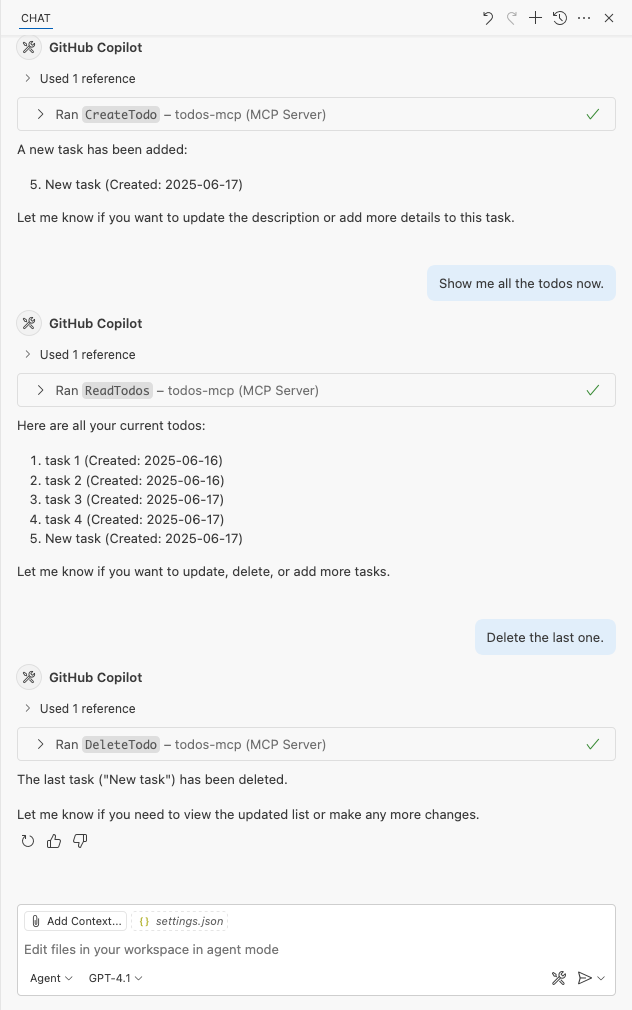
If your web application already has useful features, like shopping, hotel booking, or data management, it's easy to make those capabilities available for:
- Any application that supports MCP integration, such as GitHub Copilot Chat agent mode in Visual Studio Code or in GitHub Codespaces.
- A custom agent that accesses remote tools by using an MCP client.
By adding an MCP server to your web app, you enable an agent to understand and use your app's capabilities when it responds to user prompts. This means anything your app can do, the agent can do too.
- Add an MCP server to your web app.
- Test the MCP server locally in GitHub Copilot Chat agent mode.
- Deploy the MCP server to Azure App Service and connect to it in GitHub Copilot Chat.
Prerequisites
This tutorial assumes you're working with the sample used in Tutorial: Deploy a Node.js + MongoDB web app to Azure.
At a minimum, open the sample application in GitHub Codespaces and deploy the app by running azd up.
Add MCP server to your web app
In the codespace terminal, add the required npm packages to your project:
npm install @modelcontextprotocol/sdk@latest zod-
- Open routes/index.js. For simplicity of the scenario, you'll add all of your MCP server code here.
At the top of routes/index.js, add the following requires:
const { McpServer } = require('@modelcontextprotocol/sdk/server/mcp.js'); const { StreamableHTTPServerTransport } = require('@modelcontextprotocol/sdk/server/streamableHttp.js'); const { z } = require('zod');At the bottom of the file, above
module.exports = router;add the following route for the MCP server.router.post('/api/mcp', async function(req, res, next) { try { // Stateless server instance for each request const server = new McpServer({ name: "task-crud-server", version: "1.0.0" }); // Register tools server.registerTool( "create_task", { description: 'Create a new task', inputSchema: { taskName: z.string().describe('Name of the task to create') }, }, async ({ taskName }) => { const task = new Task({ taskName: taskName, createDate: new Date(), }); await task.save(); return { content: [ { type: 'text', text: `Task created: ${JSON.stringify(task)}` } ] }; } ); server.registerTool( "get_tasks", { description: 'Get all tasks' }, async () => { const tasks = await Task.find(); return { content: [ { type: 'text', text: `All tasks: ${JSON.stringify(tasks, null, 2)}` } ] }; } ); server.registerTool( "get_task", { description: 'Get a task by ID', inputSchema: { id: z.string().describe('Task ID') }, }, async ({ id }) => { try { const task = await Task.findById(id); if (!task) { throw new Error(); } return { content: [ { type: 'text', text: `Task: ${JSON.stringify(task)}` } ] }; } catch (error) { return { content: [ { type: 'text', text: `Task not found with ID: ${id}` } ], isError: true }; } } ); server.registerTool( "update_task", { description: 'Update a task', inputSchema: { id: z.string().describe('Task ID'), taskName: z.string().optional().describe('New task name'), completed: z.boolean().optional().describe('Task completion status') }, }, async ({ id, taskName, completed }) => { try { const updateData = {}; if (taskName !== undefined) updateData.taskName = taskName; if (completed !== undefined) { updateData.completed = completed; if (completed === true) { updateData.completedDate = new Date(); } } const task = await Task.findByIdAndUpdate(id, updateData); if (!task) { throw new Error(); } return { content: [ { type: 'text', text: `Task updated: ${JSON.stringify(task)}` } ] }; } catch (error) { return { content: [ { type: 'text', text: `Task not found with ID: ${id}` } ], isError: true }; } } ); server.registerTool( "delete_task", { description: 'Delete a task', inputSchema: { id: z.string().describe('Task ID to delete') }, }, async ({ id }) => { try { const task = await Task.findByIdAndDelete(id); if (!task) { throw new Error(); } return { content: [ { type: 'text', text: `Task deleted successfully: ${JSON.stringify(task)}` } ] }; } catch (error) { return { content: [ { type: 'text', text: `Task not found with ID: ${id}` } ], isError: true }; } } ); // Create fresh transport for this request const transport = new StreamableHTTPServerTransport({ sessionIdGenerator: undefined, }); // Clean up when request closes res.on('close', () => { transport.close(); server.close(); }); await server.connect(transport); await transport.handleRequest(req, res, req.body); } catch (error) { console.error('Error handling MCP request:', error); if (!res.headersSent) { res.status(500).json({ jsonrpc: '2.0', error: { code: -32603, message: 'Internal server error', }, id: null, }); } } });This route sets your MCP server endpoint to
<url>/api/mcpand uses the stateless mode pattern in the MCP TypeScript SDK.server.registerTool()adds a tool to the MCP server with its implementation.- The SDK uses zod for input validation.
descriptionin the configuration object anddescribe()ininputSchemaprovide human-readable descriptions for tools and input. They help the calling agent to understand how to use the tools and their parameters.
This route duplicates the create-read-update-delete (CRUD) functionality of the existing routes, which is unnecessary, but you'll keep it for simplicity. A best practice would be to move the app logic to a module, then call the module from all routes.
Test the MCP server locally
In the codespace terminal, run the application with
npm start.Select Open in Browser, then add a task.
Leave
npm startrunning. Your MCP server is running athttp://localhost:3000/api/mcpnow.Back in the codespace, open Copilot Chat, then select Agent mode in the prompt box.
Select the Tools button, then select Add More Tools... in the dropdown.
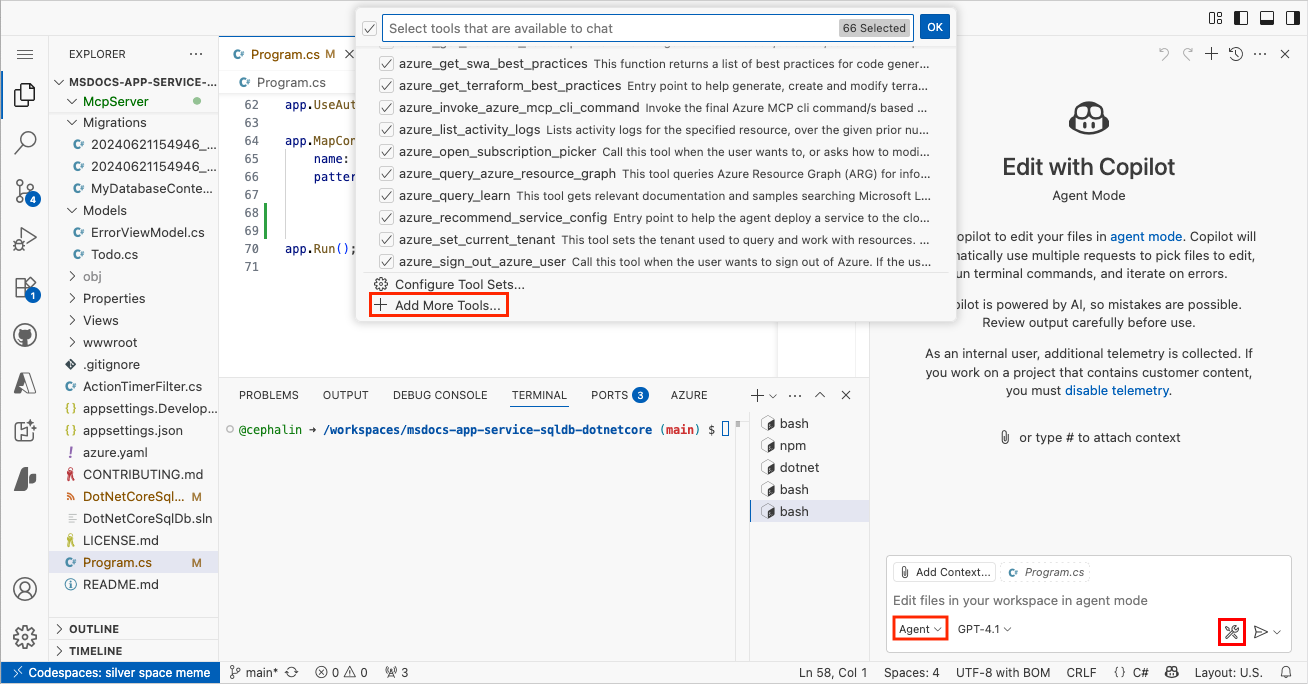
Select Add MCP Server.
Select HTTP (HTTP or Server-Sent Events).
In Enter Server URL, type http://localhost:3000/api/mcp.
In Enter Server ID, type todos-mcp or any name you like.
Select Workspace Settings.
In a new Copilot Chat window, type something like "Show me the todos."
By default, GitHub Copilot shows you a security confirmation when you invoke an MCP server. Select Continue.
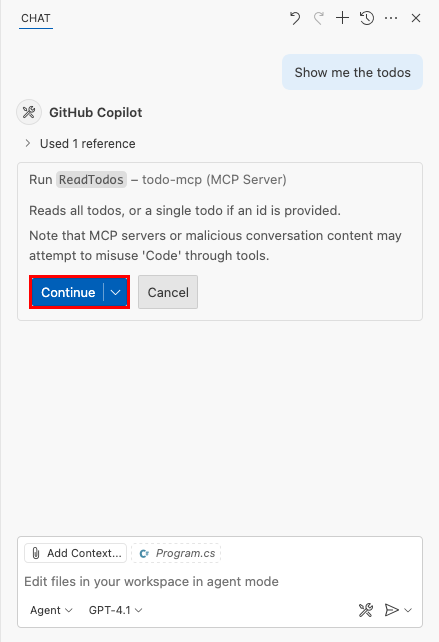
You should now see a response that indicates that the MCP tool call is successful.
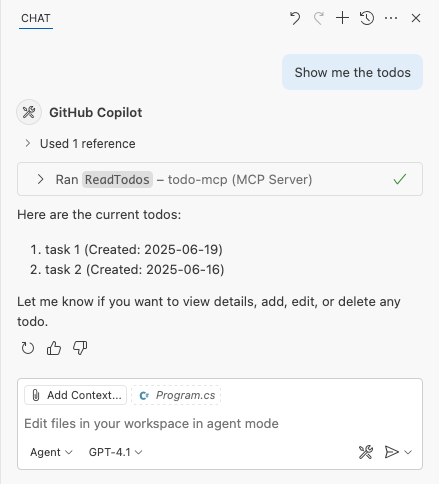
Deploy your MCP server to App Service
Back in the codespace terminal, deploy your changes by committing your changes (GitHub Actions method) or run
azd up(Azure Developer CLI method).In the AZD output, find the URL of your app. The URL looks like this in the AZD output:
Deploying services (azd deploy) (✓) Done: Deploying service web - Endpoint: <app-url>
Once
azd upfinishes, open .vscode/mcp.json. Change the URL to<app-url>/api/mcp.Above your modified MCP server configuration, select Start.
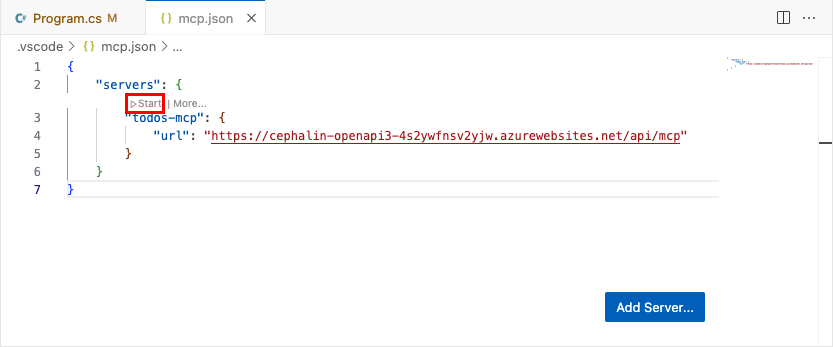
Start a new GitHub Copilot Chat window. You should be able to view, create, update, and delete tasks in the Copilot agent.
Security best practices
When your MCP server is called by an agent powered by large language models (LLM), be aware of prompt injection attacks. Consider the following security best practices:
- Authentication and Authorization: Protect your MCP endpoints in App Service behind Azure API Management with Microsoft Entra ID and ensure only authorized users or agents can access the tools.
- Input Validation and Sanitization: The example code in this tutorial uses zod for input validation, ensuring that incoming data matches the expected schema. For additional security, consider:
- Validating and sanitizing all user input before processing, especially for fields used in database queries or output.
- Escaping output in responses to prevent cross-site scripting (XSS) if your API is consumed by browsers.
- Applying strict schemas and default values in your models to avoid unexpected data.
- HTTPS: The sample relies on Azure App Service, which enforces HTTPS by default and provides free TLS/SSL certificates to encrypt data in transit.
- Least Privilege Principle: Expose only the necessary tools and data required for your use case. Avoid exposing sensitive operations unless necessary.
- Rate Limiting and Throttling: Use API Management or custom middleware to prevent abuse and denial-of-service attacks.
- Logging and Monitoring: Log access and usage of MCP endpoints for auditing and anomaly detection. Monitor for suspicious activity.
- CORS Configuration: Restrict cross-origin requests to trusted domains if your MCP server is accessed from browsers. For more information, see Enable CORS.
- Regular Updates: Keep your dependencies up to date to mitigate known vulnerabilities.